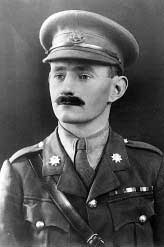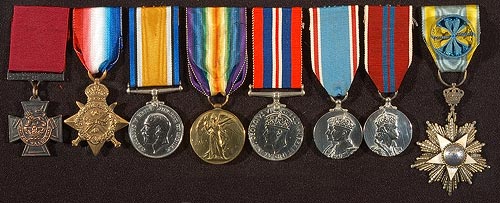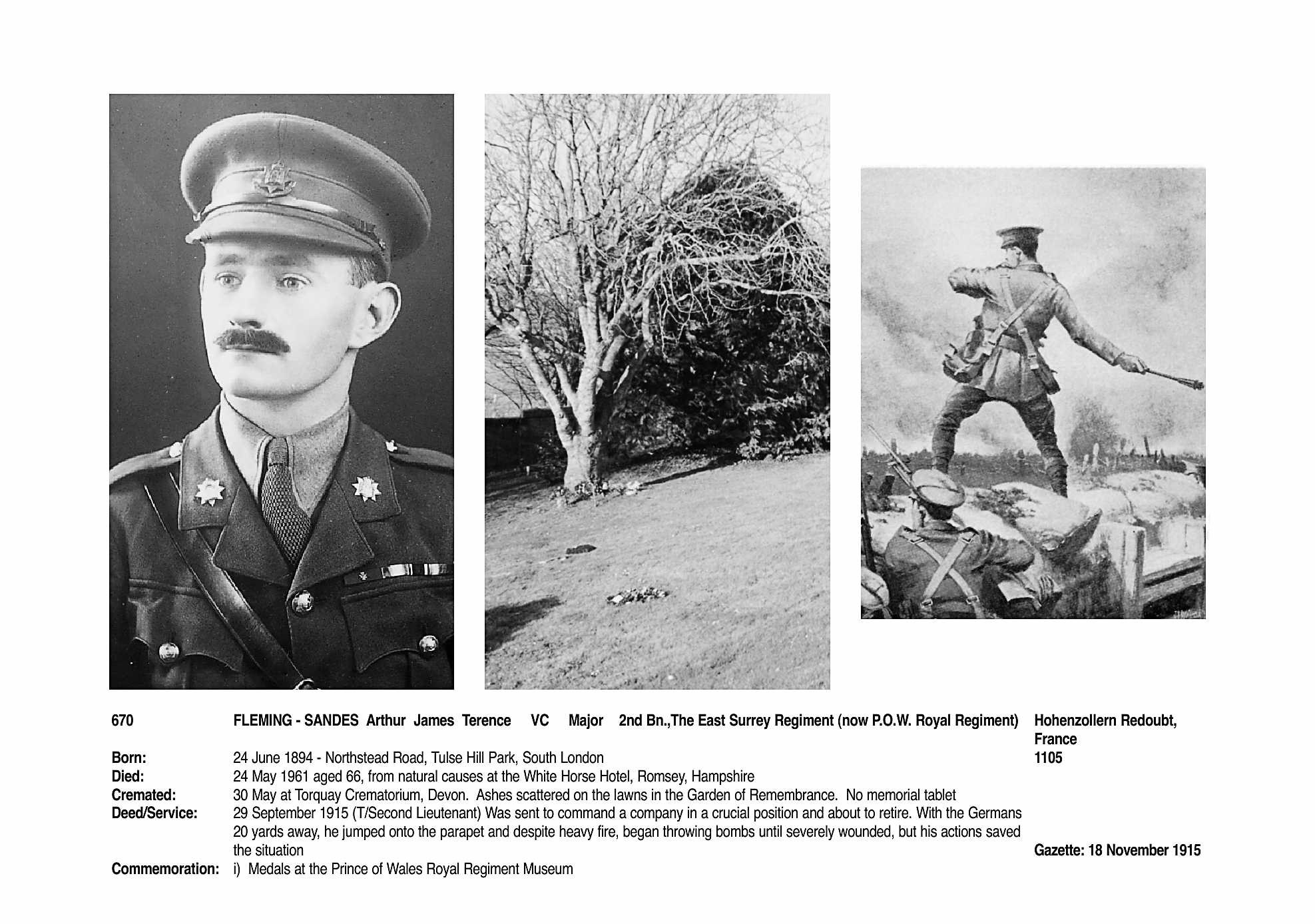Second Lieutenant (later Captain)
Arthur James Terence Fleming-Sandes VC
Order of The Nile 4th Class
2nd Battalion The East Surrey Regiment
 |
| Second Lieutenant (later Captain) Arthur James Terence Fleming-Sandes VC, Order of The Nile 4th Class |
Born at Tulse Hill, London, on 24th June 1894, Fleming-Sandes was educated at Dulwich College Preparatory School and King’s School Canterbury. On 5th August, 1914, the day after the declaration of war, he at once enlisted in the Artists' Rifles and landed in France with the 1st Battalion in October He was commissioned into the East Surrey Regiment on 9th May, 1915, and joined the 2nd Battalion in Belgium. While recovering from the severe wounds which he received at the Hohenzollern Redoubt he was an instructor with an Officer Cadet Battalion at Trinity College, Cambridge, and it was not until October 1918, that he was fit enough to rejoin the Regiment in France.
In January 1919, he was demobilised and became a master at Copthorne School, Sussex, but finding that fighting was continuing in various parts of the world, he insisted on being recalled. For a short time he served in the War Office until he was accepted for the Sudan Civil Service and appointed to the Education Department at Khartoum. He served the Sudan for 25 years until he retired in 1944 on reaching the age limit. Of this period it has been said of him that "on one member of the Sudan Administration did more to build its great tradition of public service by unostentatious devotion to duty and by personal example."
In 1924, after five years at Gordon College, Khartoum, he was seconded to the Political Department and after attaining high honours in the Bar Examinations, was called to the Bar at Gray's Inn in 1927. Shortly afterwards he was appointed a District Judge. To him fell the task of carrying out extencive "settlement" of White Nile lands in preparation for the opening of the Jebel Aulia Dam, registering titles and deciding disputed claims. It was hard and laborious work performed under conditions of considerable hardship and was an acknowledged masterpiece of industry and competence. With characteristic thoroughness every problem, however tedious or difficult, was faithfully tackled and he never hesitated to give decisive judgements which left no loophole for subsequent argument.
It was in 1932 that Sandy married Miss Dorothea Weeks. He could have received no greater blessing that this partnership with a gentle and loyal lady, beloved by all who knew her. She truly "followed the drum, and where she was, there was home."
From 1935 until his retirement in 1944 he was a Judge of the High Court, first in Gezira Province and then in Khartoum, from time to time acting as Chief Justice. From 1942 to 1944 he was also Judge Advocate General of the Sudan Defence Force. The most considerate of men, his patience and unfailing and esteem throughout the Sudan. It was in keeping with his high standards that he became an expert in the Arabic language, since this enabled him always to hear every case in the vernacular in fairness to the accused and to avoid any suspicion of misinterpretation. He was never satisfied until he had unravelled all the complications and misunderstandings surrounding a case and, if he had to inflict a heavy sentence, he invariably explained most carefully to the prisioner his right of appeal and indeed urged him to exercise it.
After his retirement from the Sudan he was appointed Chairman of the Pensions Appeal Tribunal for England and Wales and in this, his last task, he laboured with the same devotion and skill until he was forced by ill health to give up work in 1958. This had entailed frequent travelling and absences from home at a time when lesser man might have felt entitled to some relaxation, but his disciplined character and inflexible standards dictated otherwise.
He was awarded the Order of the Nile 4th Class in 1932. He died at Romsey, Hampshire, on 24th May 1961 and was cremated at Torquay, Devon. His Victoria Cross is held by The Queen’s Royal Surrey Regiment museum at Clandon.
His Citation reads:-
“For most conspicuous bravery at Hohenzollern Redoubt on 29th September 1915. Second-Lieutenant Fleming-Sandes was sent to command a company which at the time was in a very critical position. The troops on his right were retiring and his own men, who were much shaken by continual bombing and machine-gun fire, were also beginning to retire owing to shortage of bombs. Taking in the situation at a glance, he collected a few bombs, jumped on the parapet in full view of the Germans, who were only twenty yards away, and threw them. Although very severely wounded almost at once by a bomb, he struggled to his feet and continued to advance and throw bombs until he was again severely wounded. This most gallant action put new heart into his men, rallied them and saved the situation”.
Date
of Act of Bravery |
London
Gazette |
On the 20th April 1915 at Hill 60, Ypres the 1st Bn The East Surrey Regiment were involved in bitter fighting. Three members of The East Surrey Regiment, showing what is described as “most conspicuous bravery and devotion to duty”, etched their way into history and gained Victoria Crosses in the process.

Medals of Second
Lieutenant (later Captain) AJT Fleming-Sandes VC,
Order of The Nile 4th Class.
Stolen medals
During Capt. Fleming-Sandes service in the Sudan the medals were stolen from his bungalow. The case in which the medals had been kept was subsequently recovered. It then contained only the Victoria Cross. The thief had evidently discarded the little bronze cross as being of no apparent value. The war medals and the Order of the Nile were never recovered and were replaced. "All that glitters is not gold."

(Click image to view enlarged)
Related Links
Stolen medals
During Capt. Fleming-Sandes service in the Sudan the medals were stolen from his bungalow. The case in which the medals had been kept was subsequently recovered. It then contained only the Victoria Cross. The thief had evidently discarded the little bronze cross as being of no apparent value. The war medals and the Order of the Nile were never recovered and were replaced. "All that glitters is not gold."
External websites:
